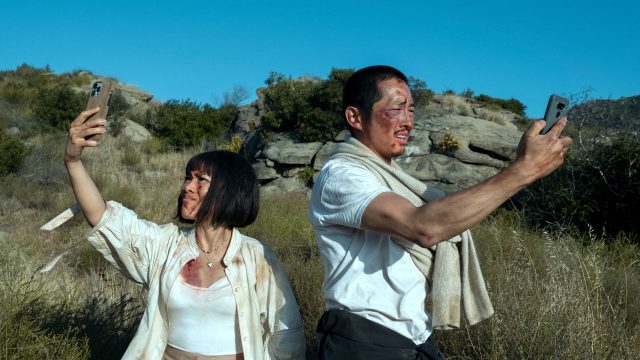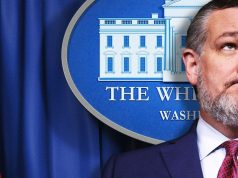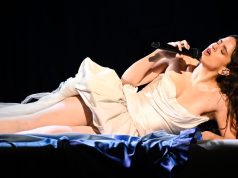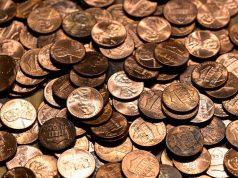
Pitch-black comedy has been one of the defining features of 21st-century television, as the industry moved from the earnest family sitcoms of the 1970s and 1980s — think “Family Ties” — to shows that feel like those show’s antitheses in both spirit and tone. While this can be a delicate balance to strike, TV’s best dark comedies can be genuinely funny while offering sharp critiques of politics and society.
‘The Office’ (2001-2003)
The better-known American remake toned down this caustic British original, which ran for just two seasons and a two-part “Christmas special” denouement. Ricky Gervais plays David Brent, the office manager of a middling paper company in Slough whose crippling insecurity manifests as constant, cringey manipulation of his exasperated employees.
The now-cliched formula of a camera crew making a documentary about the office was fresh at the time, and the supporting characters were spot on, particularly the lovelorn Tim (Martin Freeman) and Dawn (Lucy Davis). The “amazingly realistic, amazingly awkward, amazingly embarrassing” show is powered by Brent’s “desperation to be cool, to be seen, to be recognized, to be famous,” which turned a “basically decent idiot into an engine of humiliation,” said Willa Paskin at Slate. (Hulu)
‘It’s Always Sunny in Philadelphia’ (2005-)
“It’s Always Sunny in Philadelphia” is still airing new episodes even though its debut episode is almost old enough to drink. The formula hasn’t changed: Charlie (Charlie Day), Dennis (Glenn Howerton), Mac (Rob Mac), Dennis’ sister Dee (Kaitlin Olson) and the Reynolds patriarch, Frank (Danny DeVito), are ”the gang,” a group of shallow, self-destructive narcissists who run a Philadelphia Irish dive bar called Paddy’s.
A representative plot line from season two sees the gang trying to get someone from the Church to bless a stain in the bar that resembles the Virgin Mary. Dee seduces a priest (David Hornsby) to get the blessing and then spurns him when he leaves the priesthood for her. A show about “venal borderline alcoholics who would be actively hateful if they weren’t so hilarious,” it is consistently both “transgressive and ingenious,” said Graeme Virtue at The Guardian. (Hulu)
‘You’re the Worst’ (2014-2019)
Even for a genre that’s stock-in-trade is repellent characters, FX’s “You’re the Worst” tests the audience’s tolerance with the theatrically cruel and flailing novelist Jimmy (Chris Geere) and depressed, ironically detached music publicist Gretchen (Aya Cash), whose one-night stand at a wedding eventually becomes much more than either intended. While it never softens its blunt edges, the show eventually allows itself some more earnest exploration of trauma, mental illness and emotional avoidance. Gretchen and Jimmy are “photonegatives of saccharine rom-com protagonists” in a show that deftly mixes bleak humor “with moments of surprising tenderness,” said Michael Haigis at Slant Magazine. (Hulu)
‘Search Party’ (2016-2022)
TBS’s comedy (later rehomed by HBO for its third and fourth seasons) is a unique take on the formula of a friendship group composed entirely of narcissists. Dory (Alia Shawkat) is a failing-to-launch Brooklyn Millennial who convinces her boyfriend, Drew (John Reynolds), and their friends Portia (Meredith Hagner) and Elliott (John Early) to join her strange, obsessive quest to find a college acquaintance, Chantal (Clare McNulty), who has gone missing.
But because Dory barely knew Chantal, it’s clear that the “search” is really a stand-in for the hollowness at the core of these characters. The “pitch-black” show’s ultimate target is the “tendency to confuse the ego-stroking virtual busywork of the text- and social media-driven era for actual, meaningful action,” said Matt Zoller Seitz at Vulture. (Hulu)
‘Fleabag’ (2016-2019)
Despite its short, two-season run, “Fleabag’ was an enormously influential and successful series. Phoebe Waller-Bridge delivered an Emmy-winning performance as the fourth-wall-breaking title character, a thirtysomething London cafe owner nursing a bitter secret about her role in her best friend’s suicide.
The show’s frank and graphic depiction of the way that Fleabag uses sex to distract from what she calls a “screaming void inside my empty heart” was both hilarious and sad. It also turned Waller-Bridge into a bona fide star. A show with “almost feral energy,” it combines “naked confessionalism and comic artifice” to “tap veins of honest emotion,” said Mike Hale at The New York Times. (Prime)
‘Barry’ (2018-2013)
Barry Berkman (Bill Hader) is a hitman who joins an embarrassingly terrible Los Angeles acting class led by Gene Cousineau (Henry Winkler) to take out a target for Chechen mobster NoHo Hank (a scene-stealing Anthony Carrigan). But Barry soon becomes involved with aspiring starlet Sally (Sarah Goldberg) and then decides he actually wants to be an actor rather than a killer, setting off a series-long effort to extract himself from the murder business.
Simultaneously an organized crime satire and a send-up of L.A.’s meat-grinder performance culture, “Barry” “unfurled into something of an existential epic” by its time-jumping fourth season, with comedic elements that provided “ideal backdrops for the series’ explorations of the inconvenience of truth,” said Inkoo Kang at The New Yorker. (HBO Max)
‘The Great’ (2020-2023)
If the tone of “The Great” feels instantly recognizable, it’s because series creator Tony McNamara is the writer of both “The Favourite” and “Poor Things.” Elle Fanning plays Catherine the Great, who in season 1 schemes to depose her husband, Peter (Nicholas Hoult), depicted here as a shallow, stupid libertine whose tagline is “Huzzah!”
A show that is much more interested in lampooning the habits of aristocrats than in historical accuracy, “The Great” was a showcase for its leads and featured tremendous supporting performances from actors like Douglas Hodge, playing the fictional military leader Velementov. The series is best enjoyed if you allow yourself the pleasure of watching “hot people having sex, plotting against one another, having an occasional bout of feminist thought and killing people,” said Delia Harrington at Den of Geek. (Hulu)
‘Beef’ (2023)
Lee Sung Jin’s devastatingly funny black comedy follows the fallout from an escalating feud between struggling contractor Danny Cho (Steven Yeun) and gilded girlboss Amy Lau (Ali Wong) that starts with a routine road rage incident. Before long, Danny and Amy are obsessively trying to destroy one another in a series of set-piece revenge plots that combine terrible decision-making with pinpoint comic timing.
It’s also one of the first major commercial successes in U.S. television featuring Korean-American leads. A “thought-provoking and insidious character study,” the show is propelled by a “daring script elevated by flawless performances from both actors,” said Saloni Gajjar at The AV Club. (Netflix)
‘Such Brave Girls’ (2024-)
In the third episode of Hulu’s boundary-shredding British comedy, teenage Billie (Lizzie Davidson) pauses her raunchy text-messaging only long enough to have an abortion. She lives with her aimless, deadpan, suicidal older sister, Josie (Davidson’s real-life sibling Kat Sadler), and their hapless mother, Deb (Louise Brealey), who is desperately trying to land a man to pull them out of economic precarity. “Brutally honest, narratively unhinged, and utterly fearless,” the show and its “deeply unlikeable” characters skewer “everything from feminism and self-help platitudes to sisterhood and mental health services,” said Lacy Baugher Milas at Paste Magazine. (Hulu)
From workplace satire to family dysfunction, nothing is sacred for these renowned, boundary-pushing comedies





